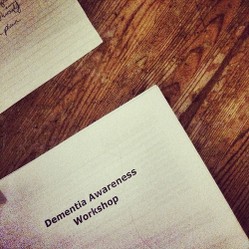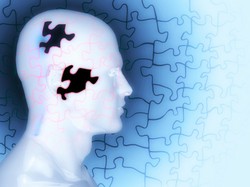Dementia carers are often advised to increase the level of interaction a dementia sufferer has with other people. Puzzles, games and quizzes are all thought to be excellent ways of engaging with the elderly dementia patient, but what is the evidence that such interventions are efficacious. This article will take a quick look at the existing evidence and point to sites that may be of interest to families and carers.

Puzzles And Paradoxes Improve Mental Health
by ghemmings
A review of recent research on approaches to improve the outcomes for people suffering from dementia.
Woods, Aguirre, Spector, and Orrell's Meta Review Of Cognitive Stimulation and Dementia Care
People with dementia and their caregivers are encouraged to take metal exercise as well as the more commonly prescribed physical exercise. The justification for such an intervention seems already well established, however for those people new to caring for the elderly, and for those who are yet to have seen the results of their endeavours, a recent review set out to examine the evidence in support of cognitive stimulation.
Cognitive stimulation is a broad and inclusive term used to describe a range of activities which include discussion of past and present events and topics of interest, word games, puzzles, music and practical activities such as baking or indoor gardening.
The meta review, conducted by Woods, Aguirre, Spector, and Orrell, featured 15 trials with 718 participants with mild to moderate levels of dementia. Every member of the study group was involved in cognitive stimulation for at least a month, with no restriction on the number of treatment sessions being imposed. Outcomes were measured as the impact on dementia sufferer and care giver, and were noted for their duration. Pre and Post study scores on standardised tests, rating scales and questionnaires were taken as indicative of changes that may have occurred.
The findings of the meta review strongly support the view that cognitive stimulation has a beneficial effect on the memory and thinking test scores of people with dementia.
"The results of the meta-analyses reported here indicate that cognitive stimulation programmes for dementia have a significant positive effect on cognition, which is evident in the post-2000 studies included in this review as well as in the older studies which were included in our previous review of Reality Orientation... In contrast, there was no indication that cognitive stimulation was associated with changes in mood, whether self-rated or rated by staff, or in behaviour including activities of daily living and selfcare and problem behaviour. It is notable that in general there is much less evidence available regarding these domains compared with that available for changes in cognition. No benefits to family caregivers were identified in terms of mood or caregiver burden."
Unsurprisingly, the effects of cognitive stimulation are purely cognitive, they improve the thinking skills of the participants without necessarily affecting the emotional state of the participant. However, it is fair to say that an improvement in cognitive ability will have the corresponding affect of improving communication, and this in turn will have an affect on emotion.
Cognitive Stimulation Meta Review
Full Text of the Meta Review presented in this article.
Puzzles And Paradoxes To Improve Mental Health
Website with a range of puzzles, crosswords, philosophical and logical paradoxes for carers to use during Cognitive Stimulation sessions.
Philosophy promotes creativity in thought
Thinking about paradoxes can help in gaining insight into the puzzle of dementia
You might also like
Recognizing Dementia in Your Parents: More than Just ForgettingHaving a parent diagnosed with dementia can be devastating. When people think...
Positive Thinking or Realism: Which Side Are You On?There is nothing wrong with having a hopeful outlook on life. As long as one ...





 Make money from the graphene revolutionon 02/11/2012
Make money from the graphene revolutionon 02/11/2012
 What is a mesomorph?on 01/14/2012
What is a mesomorph?on 01/14/2012
 Mesomorph Exercises and Nordic Walkingon 01/04/2012
Mesomorph Exercises and Nordic Walkingon 01/04/2012



Comments